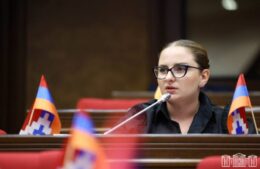Armenian Genocide dispute brings California Legislature into global policymaking
- (0)

Sacramento Bee – While the California Legislature can only set policy for the state’s nearly 40 million residents, its ambitions are often much grander. With, we are often reminded, one of the largest economies in the world to dangle and deploy for influence, lawmakers regularly wade into issues on the global stage, thousands of miles from California’s borders.
The tense relations between Armenia and Turkey, which continues to deny that the then-Ottoman Empire committed a genocide of 1.5 million Armenians during World War I, is a perpetual topic. California has the largest population of ethnic Armenians outside of Armenia — hundreds of thousands in Los Angeles County alone — and there is an annual resolution to recognize the Armenian Genocide.
Last year, the Assembly even passed a bill to prohibit California’s public employee retirement funds from investing with the Turkish government, though it ultimately died in a Senate committee.
The divestment push has found more success at the University of California, which is reported to hold more than $70 million in Turkish bonds and investments. Activists have pushed the student governments at nearly every campus to pass resolutions urging UC to divest.
A Senate hearing, 1 p.m. in Room 2040 of the Capitol, will highlight that campaign by inviting the student founders of the Divest Turkey movement to testify. Jagdeep Singh Bachher, UC’s chief investment officer and vice president of investments, is also slated to discuss why UC remains committed to its financial obligations in Turkey.
Sen. Anthony Portantino, a Democrat from La Cañada Flintridge who represents a large Armenian-American population and will chair the hearing, said California should treat Turkey the same way it does Iran, which the state divested from a decade ago.
“If I can help highlight those human rights atrocities and use that as a justification for divestiture, I’m going to do that,” Portantino said. “At the end of the day, we’re talking about Californians with both human and business ties to these countries.”


















